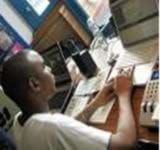Web In Infancy, Says Berners-Lee Website
The world wide web is "still in its infancy", the web's inventor Sir Tim Berners-Lee has told BBC News. He was speaking ahead of the 15th anniversary of the day the web's code was put into the public domain by Cern, the lab where the web was developed. The future web will put "all the data in the world" at the fingertips of every user, Sir Tim said. "The web has been a tremendous tool for people to do a lot of good even though you can find bad stuff out there." Making the web free to use had a vital role in spreading its use worldwide. There are now 165 million different websites around the world, according to internet research firm Netcraft. Sir Tim said he was optimistic about the future of the web. 'Fantastic experience' "The experience of the development of the web by so many people collaborating across the globe has just been a fantastic experience," he said. "The experience of international collaboration continues. Also the spirit that really we have only started to explore the possibilities of [the web], that continues." Sir Tim predicted that the web's ability to engender collaboration could one day see the web being used to help manage the planet. "What's exciting is that people are building new social systems, new systems of review, new systems of governance. "My hope is that those will produce... new ways of working together effectively and fairly which we can use globally to manage ourselves as a planet." The ubiquity of the web gives the impression that its success was inevitable but that was not always the case, said Robert Cailliau, who worked alongside Sir Tim. The decision by physics laboratory Cern to release the web code into the public domain was not a straightforward one, he told BBC News. Technical proposals Mr Cailliau helped draw up one of the early technical proposals for the web and later helped convince the directors at Cern to "give the web away". "The difficult part was explaining to them the true nature of what the web was going to be," he said. "We had to convince them that this was going to take off and it was a really big thing. And therefore Cern couldn't hold on to it and the best thing to do was to give it away." He said competing technologies, such as Gopher, which was developed at the University of Minnesota, were also offering a method of using hyperlinks to connect documents across computers on the internet. "If we had put a price on it like the University of Minnesota had done with Gopher then it would not have expanded into what it is now. "We would have had some sort of market share alongside services like AOL and Compuserve, but we would not have flattened the world."
Source: MJFM








